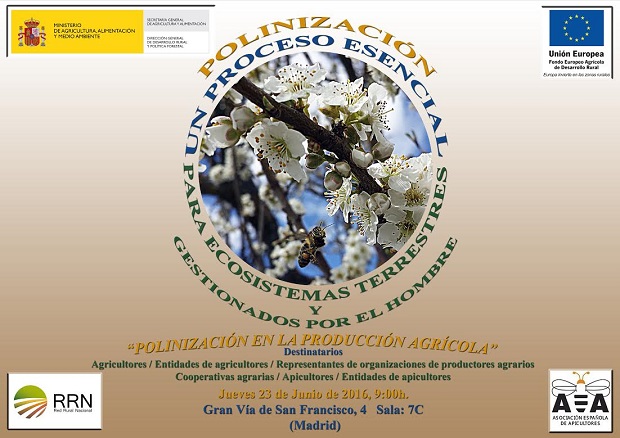
23 de June de 2016
The conference on "Pollination in agricultural production" focused on the need for professionalization of beekeepers due to the economic and environmental benefits of this activity.
June 23, 2016
The meeting was proposed by the Spanish Beekeepers Association and organized by the General Directorate of Rural Development and Forestry Policy (MAGRAMA), and brought together around 50 people representing the beekeeping, agricultural, and research sectors.
María Dolores Chiquero Sánchez, Deputy Director General of Farm Modernization, introduced the session and introduced the speakers.
The representatives of the Spanish Beekeepers Association (AEA), Miguel Ángel Casado and Juan Carlos Álvarez, began the presentations. They expressed the association's concern about the decline in the bee population due to the lack of control over the use of pesticides and phytosanitary products. They also highlighted the role of beekeeping as a mechanism for establishing populations in rural areas, in addition to being beneficial for agricultural production and the environment. Álvarez emphasized the importance of professionalizing and standardizing pollination services, for which he presented the innovative project proposal "Pollination in Crops and Wild Environments."
Vicent Mathieu, from DSTFL of the Êquipe Fruits Ctifl at the Balandran center, explained his team's development to model the effectiveness of bee pollination based on a wide variety of criteria. Joan Bonany, director of the IRTA Sweet Fruit subprogram, focused his presentation on the results obtained in various trials focused on apple pollination. Meanwhile, researcher David Atauri highlighted the problems with pollination services for producers and beekeepers and presented the results of trials to calculate bee activity and mortality in hives as part of a pollination quantification model. All these factors and studies are essential for the professionalization of the sector.
Dr. Concepción Ornosa, a biologist, spoke about the physiology and diversity of bee species and their potential as pollinators. She noted the population decline they are experiencing and the possible factors influencing hive collapse.
From the agricultural sector's perspective, Carlos Baixauli Soria, from the Cajamar Experience Center in Paiporta, spoke about the importance of pollination in agriculture depending on the crop variety.
To conclude the day, beekeeper Sergio Malero shared his experience, highlighting the advantages offered by pollination services, such as improved fruit and vegetable production and increased bee population.
The presentations and program of the day can be downloaded here:
PROGRAM .
Modeling the efficiency of bee pollination. Vincent Mathieu
Pollination in apple trees. Results of various trials and perspectives. Joan Bonany
Quantifying Pollination . David Atauri
Practical experience. . Sergio Maleno











